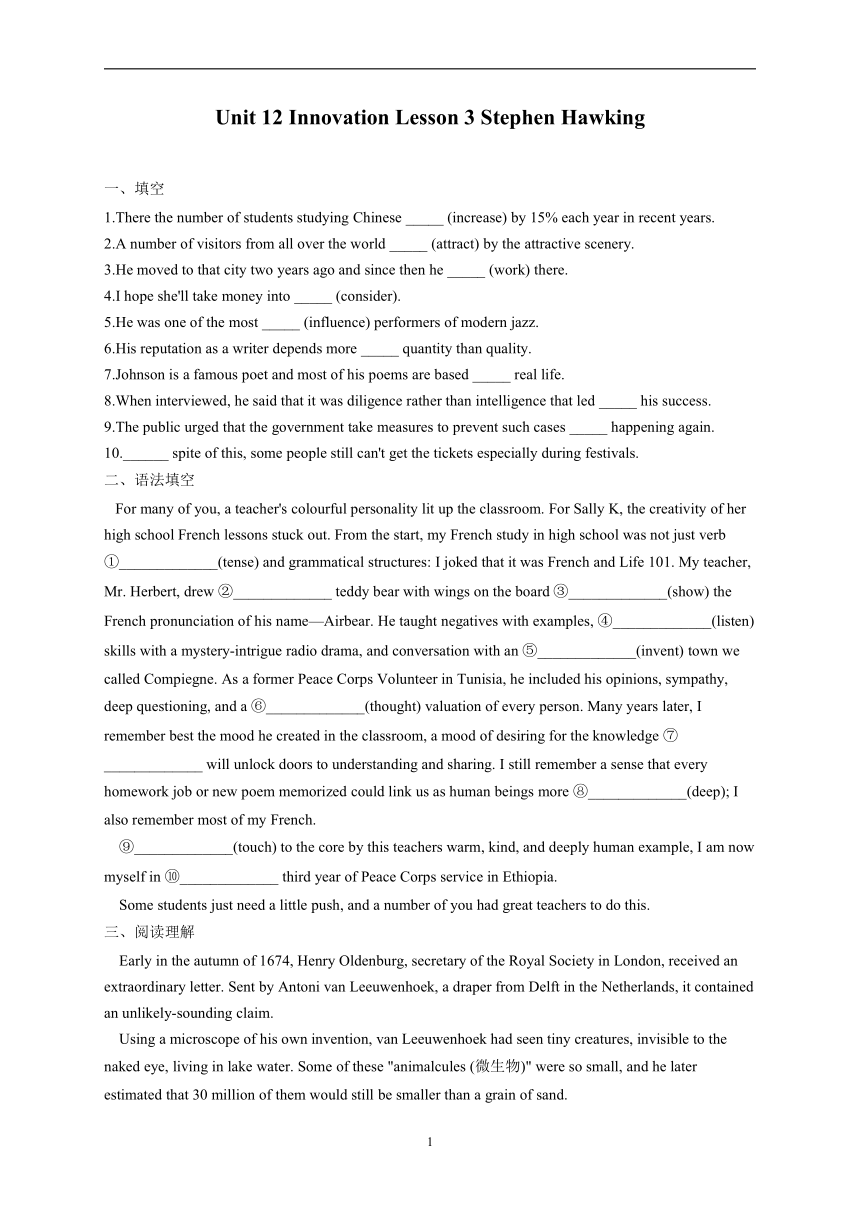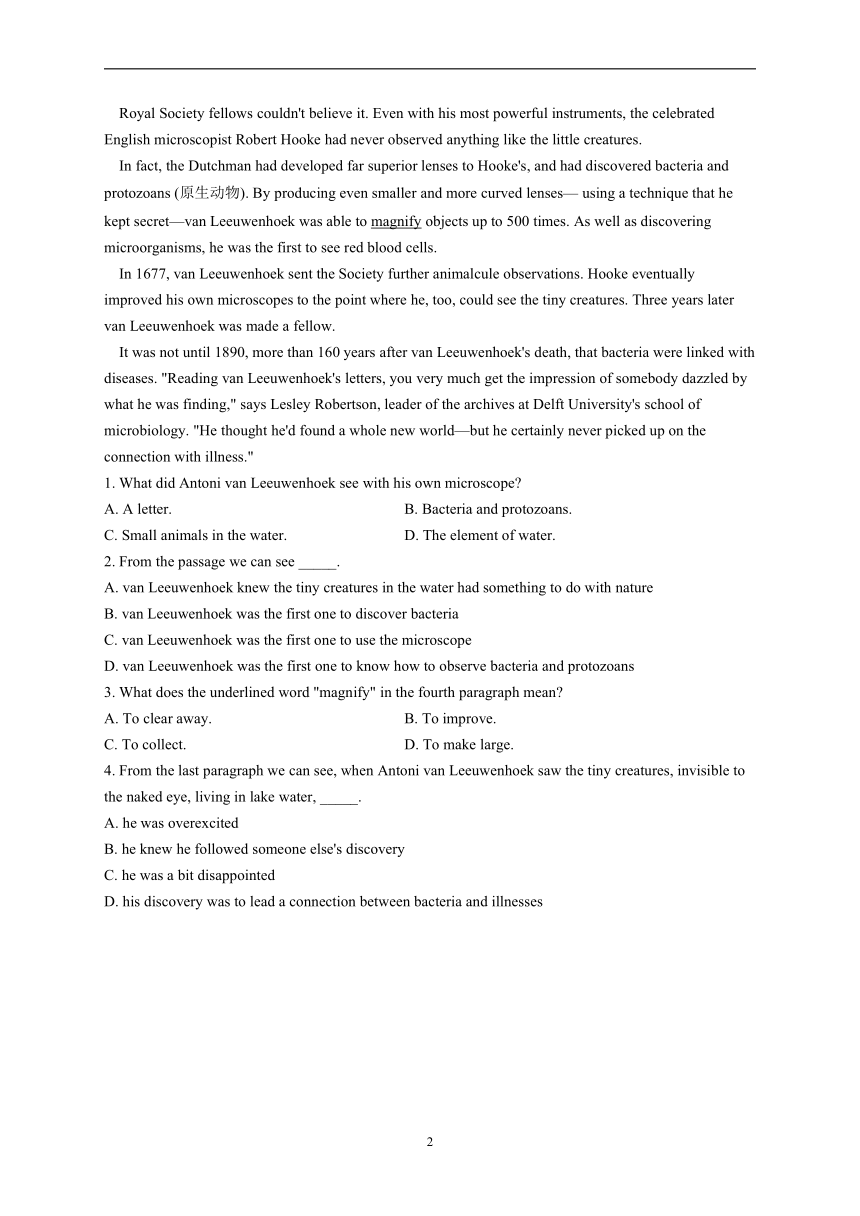北师大版(2019)选择性必修第四册Unit 12 Innovation Lesson 3 Stephen Hawking同步课时作业(有答案)
文档属性
| 名称 | 北师大版(2019)选择性必修第四册Unit 12 Innovation Lesson 3 Stephen Hawking同步课时作业(有答案) |  | |
| 格式 | docx | ||
| 文件大小 | 22.5KB | ||
| 资源类型 | 教案 | ||
| 版本资源 | 北师大版(2019) | ||
| 科目 | 英语 | ||
| 更新时间 | 2023-04-11 15:20:17 | ||
图片预览


文档简介
Unit 12 Innovation Lesson 3 Stephen Hawking
一、填空
1.There the number of students studying Chinese _____ (increase) by 15% each year in recent years.
2.A number of visitors from all over the world _____ (attract) by the attractive scenery.
3.He moved to that city two years ago and since then he _____ (work) there.
4.I hope she'll take money into _____ (consider).
5.He was one of the most _____ (influence) performers of modern jazz.
6.His reputation as a writer depends more _____ quantity than quality.
7.Johnson is a famous poet and most of his poems are based _____ real life.
8.When interviewed, he said that it was diligence rather than intelligence that led _____ his success.
9.The public urged that the government take measures to prevent such cases _____ happening again.
10.______ spite of this, some people still can't get the tickets especially during festivals.
二、语法填空
For many of you, a teacher's colourful personality lit up the classroom. For Sally K, the creativity of her high school French lessons stuck out. From the start, my French study in high school was not just verb ①_____________(tense) and grammatical structures: I joked that it was French and Life 101. My teacher, Mr. Herbert, drew ②_____________ teddy bear with wings on the board ③_____________(show) the French pronunciation of his name—Airbear. He taught negatives with examples, ④_____________(listen) skills with a mystery-intrigue radio drama, and conversation with an ⑤_____________(invent) town we called Compiegne. As a former Peace Corps Volunteer in Tunisia, he included his opinions, sympathy, deep questioning, and a ⑥_____________(thought) valuation of every person. Many years later, I remember best the mood he created in the classroom, a mood of desiring for the knowledge ⑦_____________ will unlock doors to understanding and sharing. I still remember a sense that every homework job or new poem memorized could link us as human beings more ⑧_____________(deep); I also remember most of my French.
⑨_____________(touch) to the core by this teachers warm, kind, and deeply human example, I am now myself in ⑩_____________ third year of Peace Corps service in Ethiopia.
Some students just need a little push, and a number of you had great teachers to do this.
三、阅读理解
Early in the autumn of 1674, Henry Oldenburg, secretary of the Royal Society in London, received an extraordinary letter. Sent by Antoni van Leeuwenhoek, a draper from Delft in the Netherlands, it contained an unlikely-sounding claim.
Using a microscope of his own invention, van Leeuwenhoek had seen tiny creatures, invisible to the naked eye, living in lake water. Some of these "animalcules (微生物)" were so small, and he later estimated that 30 million of them would still be smaller than a grain of sand.
Royal Society fellows couldn't believe it. Even with his most powerful instruments, the celebrated English microscopist Robert Hooke had never observed anything like the little creatures.
In fact, the Dutchman had developed far superior lenses to Hooke's, and had discovered bacteria and protozoans (原生动物). By producing even smaller and more curved lenses— using a technique that he kept secret—van Leeuwenhoek was able to magnify objects up to 500 times. As well as discovering microorganisms, he was the first to see red blood cells.
In 1677, van Leeuwenhoek sent the Society further animalcule observations. Hooke eventually improved his own microscopes to the point where he, too, could see the tiny creatures. Three years later van Leeuwenhoek was made a fellow.
It was not until 1890, more than 160 years after van Leeuwenhoek's death, that bacteria were linked with diseases. "Reading van Leeuwenhoek's letters, you very much get the impression of somebody dazzled by what he was finding," says Lesley Robertson, leader of the archives at Delft University's school of microbiology. "He thought he'd found a whole new world—but he certainly never picked up on the connection with illness."
1. What did Antoni van Leeuwenhoek see with his own microscope
A. A letter. B. Bacteria and protozoans.
C. Small animals in the water. D. The element of water.
2. From the passage we can see _____.
A. van Leeuwenhoek knew the tiny creatures in the water had something to do with nature
B. van Leeuwenhoek was the first one to discover bacteria
C. van Leeuwenhoek was the first one to use the microscope
D. van Leeuwenhoek was the first one to know how to observe bacteria and protozoans
3. What does the underlined word "magnify" in the fourth paragraph mean
A. To clear away. B. To improve.
C. To collect. D. To make large.
4. From the last paragraph we can see, when Antoni van Leeuwenhoek saw the tiny creatures, invisible to the naked eye, living in lake water, _____.
A. he was overexcited
B. he knew he followed someone else's discovery
C. he was a bit disappointed
D. his discovery was to lead a connection between bacteria and illnesses
答案以及解析
一、填空
1.答案:has been increased
2.答案:are attracted
3.答案:has worked
4.答案:consideration
5.答案:influential
6.答案:on
7.答案:on
8.答案:to
9.答案:from
10.答案:In
二、语法填空
答案:tenses; a; to show; listening; invented; thoughtful; that/which; deeply; Touched; my
解析:①分析句子结构可知,and连接的前后内容为并列关系,再结合and后面的grammatical structures可知,空处应该用tense的复数形式。故填tenses。
②这里指老师画了一个泰迪熊,此处泛指一个泰迪熊,且teddy以辅音音素开头,故用不定冠词a。
③根据句意可知,此处应使用动词不定式作目的状语。
④根据语境可知,此处应使用现在分词作定语修饰skills。
⑤根据句意可知,这里表示一个虚构出来的小镇,town和invent之间为被动关系,故应用过去分词作定语。
⑥根据句意可知,此处表示考虑周到的,作valuation的定语,故应用形容词。
⑦此处引导定语从句修饰先行词 knowledge且在定语从句中作主语,故应用that/ which引导。
⑧修饰前面的动词link,应使用副词作状语。
⑨表示作者受感动,因此应使用-ed形式形容词。
⑩结合语境可知,此处指现在是作者做志愿者的第三年。
三、阅读理解
答案:1-4 BCDA
解析:1.细节理解题。根据第四段中的“In fact, the Dutchman had developed far superior lenses to Hooke's, and had discovered bacteria and protozoans.”可知,荷兰人已经通过改良的镜片发现了细菌和原生动物,Antoni van Leeuwenhoek通过自己的显微镜看到的tiny creatures就是细菌和原生动物。
2.推理判断题。通读全文可知,尽管荷兰人也看到了细菌和原生动物,但是他们使用的是改进后的镜片,而不是显微镜,因此C项正确。
3.词义猜测题。联系全文他发明显微镜以及画线词后的“up to 500 times”可知,他的显微镜能把物体放大500倍。故选D。
4.推理判断题。根据最后一段的“Reading van Leeuwenhoek's letters, you very much get the impression of somebody dazzled by what he was finding”可知,当时他对自己的发现是极度兴奋的。
2
一、填空
1.There the number of students studying Chinese _____ (increase) by 15% each year in recent years.
2.A number of visitors from all over the world _____ (attract) by the attractive scenery.
3.He moved to that city two years ago and since then he _____ (work) there.
4.I hope she'll take money into _____ (consider).
5.He was one of the most _____ (influence) performers of modern jazz.
6.His reputation as a writer depends more _____ quantity than quality.
7.Johnson is a famous poet and most of his poems are based _____ real life.
8.When interviewed, he said that it was diligence rather than intelligence that led _____ his success.
9.The public urged that the government take measures to prevent such cases _____ happening again.
10.______ spite of this, some people still can't get the tickets especially during festivals.
二、语法填空
For many of you, a teacher's colourful personality lit up the classroom. For Sally K, the creativity of her high school French lessons stuck out. From the start, my French study in high school was not just verb ①_____________(tense) and grammatical structures: I joked that it was French and Life 101. My teacher, Mr. Herbert, drew ②_____________ teddy bear with wings on the board ③_____________(show) the French pronunciation of his name—Airbear. He taught negatives with examples, ④_____________(listen) skills with a mystery-intrigue radio drama, and conversation with an ⑤_____________(invent) town we called Compiegne. As a former Peace Corps Volunteer in Tunisia, he included his opinions, sympathy, deep questioning, and a ⑥_____________(thought) valuation of every person. Many years later, I remember best the mood he created in the classroom, a mood of desiring for the knowledge ⑦_____________ will unlock doors to understanding and sharing. I still remember a sense that every homework job or new poem memorized could link us as human beings more ⑧_____________(deep); I also remember most of my French.
⑨_____________(touch) to the core by this teachers warm, kind, and deeply human example, I am now myself in ⑩_____________ third year of Peace Corps service in Ethiopia.
Some students just need a little push, and a number of you had great teachers to do this.
三、阅读理解
Early in the autumn of 1674, Henry Oldenburg, secretary of the Royal Society in London, received an extraordinary letter. Sent by Antoni van Leeuwenhoek, a draper from Delft in the Netherlands, it contained an unlikely-sounding claim.
Using a microscope of his own invention, van Leeuwenhoek had seen tiny creatures, invisible to the naked eye, living in lake water. Some of these "animalcules (微生物)" were so small, and he later estimated that 30 million of them would still be smaller than a grain of sand.
Royal Society fellows couldn't believe it. Even with his most powerful instruments, the celebrated English microscopist Robert Hooke had never observed anything like the little creatures.
In fact, the Dutchman had developed far superior lenses to Hooke's, and had discovered bacteria and protozoans (原生动物). By producing even smaller and more curved lenses— using a technique that he kept secret—van Leeuwenhoek was able to magnify objects up to 500 times. As well as discovering microorganisms, he was the first to see red blood cells.
In 1677, van Leeuwenhoek sent the Society further animalcule observations. Hooke eventually improved his own microscopes to the point where he, too, could see the tiny creatures. Three years later van Leeuwenhoek was made a fellow.
It was not until 1890, more than 160 years after van Leeuwenhoek's death, that bacteria were linked with diseases. "Reading van Leeuwenhoek's letters, you very much get the impression of somebody dazzled by what he was finding," says Lesley Robertson, leader of the archives at Delft University's school of microbiology. "He thought he'd found a whole new world—but he certainly never picked up on the connection with illness."
1. What did Antoni van Leeuwenhoek see with his own microscope
A. A letter. B. Bacteria and protozoans.
C. Small animals in the water. D. The element of water.
2. From the passage we can see _____.
A. van Leeuwenhoek knew the tiny creatures in the water had something to do with nature
B. van Leeuwenhoek was the first one to discover bacteria
C. van Leeuwenhoek was the first one to use the microscope
D. van Leeuwenhoek was the first one to know how to observe bacteria and protozoans
3. What does the underlined word "magnify" in the fourth paragraph mean
A. To clear away. B. To improve.
C. To collect. D. To make large.
4. From the last paragraph we can see, when Antoni van Leeuwenhoek saw the tiny creatures, invisible to the naked eye, living in lake water, _____.
A. he was overexcited
B. he knew he followed someone else's discovery
C. he was a bit disappointed
D. his discovery was to lead a connection between bacteria and illnesses
答案以及解析
一、填空
1.答案:has been increased
2.答案:are attracted
3.答案:has worked
4.答案:consideration
5.答案:influential
6.答案:on
7.答案:on
8.答案:to
9.答案:from
10.答案:In
二、语法填空
答案:tenses; a; to show; listening; invented; thoughtful; that/which; deeply; Touched; my
解析:①分析句子结构可知,and连接的前后内容为并列关系,再结合and后面的grammatical structures可知,空处应该用tense的复数形式。故填tenses。
②这里指老师画了一个泰迪熊,此处泛指一个泰迪熊,且teddy以辅音音素开头,故用不定冠词a。
③根据句意可知,此处应使用动词不定式作目的状语。
④根据语境可知,此处应使用现在分词作定语修饰skills。
⑤根据句意可知,这里表示一个虚构出来的小镇,town和invent之间为被动关系,故应用过去分词作定语。
⑥根据句意可知,此处表示考虑周到的,作valuation的定语,故应用形容词。
⑦此处引导定语从句修饰先行词 knowledge且在定语从句中作主语,故应用that/ which引导。
⑧修饰前面的动词link,应使用副词作状语。
⑨表示作者受感动,因此应使用-ed形式形容词。
⑩结合语境可知,此处指现在是作者做志愿者的第三年。
三、阅读理解
答案:1-4 BCDA
解析:1.细节理解题。根据第四段中的“In fact, the Dutchman had developed far superior lenses to Hooke's, and had discovered bacteria and protozoans.”可知,荷兰人已经通过改良的镜片发现了细菌和原生动物,Antoni van Leeuwenhoek通过自己的显微镜看到的tiny creatures就是细菌和原生动物。
2.推理判断题。通读全文可知,尽管荷兰人也看到了细菌和原生动物,但是他们使用的是改进后的镜片,而不是显微镜,因此C项正确。
3.词义猜测题。联系全文他发明显微镜以及画线词后的“up to 500 times”可知,他的显微镜能把物体放大500倍。故选D。
4.推理判断题。根据最后一段的“Reading van Leeuwenhoek's letters, you very much get the impression of somebody dazzled by what he was finding”可知,当时他对自己的发现是极度兴奋的。
2
同课章节目录
- Unit 10 Connections
- Lesson 1 How Closely Connected Are We?
- Lesson 2 Community Spirit
- Lesson 3 Anne of Green Gables
- Unit 11 Conflict And Compromise
- Lesson 1 Living In a Community
- Lesson 2 Dealing with Conflict
- Lesson 3 War Memories
- Unit 12 Innovation
- Lesson 1 Scientific Breakthroughs
- Lesson 2 Aha Moment
- Lesson 3 Stephen Hawking
